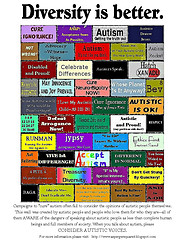To breed or not to breed?
 When I first arrived in the States, my spouse was on an H1 visa. I was unemployed. Whilst we awaited the arrival of the Green Cards, I would troll along to the blood bank to donate a litre, [translation = not approximately a pint] every 57 days. One day they told me that I was no longer eligible to donate. My blood had been contaminated by eating food in the UK. I was a little miffed at the time, [translation = put out] mainly because I had another day in every 57 days with nothing constructive to do. I was also worried that the accident that I was undoubtedly about to have, would leave me wrung out, bloodless and probably dead, with no claim to a transfusion. [translation = credit denied.] Whilst America is generally a friendly place, that was my first experience of being marginalized.
When I first arrived in the States, my spouse was on an H1 visa. I was unemployed. Whilst we awaited the arrival of the Green Cards, I would troll along to the blood bank to donate a litre, [translation = not approximately a pint] every 57 days. One day they told me that I was no longer eligible to donate. My blood had been contaminated by eating food in the UK. I was a little miffed at the time, [translation = put out] mainly because I had another day in every 57 days with nothing constructive to do. I was also worried that the accident that I was undoubtedly about to have, would leave me wrung out, bloodless and probably dead, with no claim to a transfusion. [translation = credit denied.] Whilst America is generally a friendly place, that was my first experience of being marginalized.
These days we enjoy a different kind of exclusivity, the club for parents with autistic children. It makes decrepid old Brits struggle up unexpected learning curves and research niche areas. We are disadvantaged in many ways, as it's all very well to live in the heart of Silicon Valley but it doesn't necessarily mean that you're qualified to participate in technological advances. [e.g. blogging]
However, research and practice helps you bump into unexpected facts, such as
the research by Professor Mary Croughan on Autism in California. She found a link between infertility, being old and producing an autistic child. It should be a warning to us all, well, anyone planning a family in any case. It would have been handy if that research had been available earlier, eight years earlier, then we might have made different choices, though I doubt it.
You may feel that it's not that common to have an autistic child? But that depends upon how you define common? 1 in every 150 children doesn’t seem that common, but if you have two of them, autistic children that is, then that’s a switch of fortune, a double win. As it is, although we have four children, the two boys are autistic, but that’s probably related to the fact that it’s a condition that affects boys in far greater numbers, perhaps a 3:1 ratio, but lets not get bogged down in statistics.
Professor Croughan’s research suggests that infertility is a linking factor and that may well be so, but not for us. We arrived in this land with one perfectly ordinary female child but after a couple of years of drinking the water and breathing the air, we ended up with three more children. Careless on our part I’m sure. Were we poisoned, contaminated, had our gene pool corrupted? Perhaps. Was it mercury was it the MMR vaccinations? Perhaps it was the dodgey British gene pool? We probably won’t know that for sure for a couple of decades. I’m not that bothered myself. For me and mine it’s a ‘done deal’ as we Americans say, but for everyone else, everyone else who may be contemplating a family, it is a cautionary tale to add to the list of factors that potential parents need to consider seriously, before embarking on the real family planning.
Infertility is a blight on people’s lives, whole families are affected by the lack of productivity in that department, by a particular generation. A number of people of theoretically breeding age are discovering that Plan A of career, success, financial security and then a family, is not panning out. [translation = working] Someone has put a spanner in the works of the great plan and options are narrowing as time runs out.
Things could be a whole lot worse, as her research identifies a higher risk of a choice of five conditions, four that are not autism; mental retardation, cerebral palsy, seizures and cancer, although autism comes up as the overall winner since the risk was four times higher amongst the population studied.
This is linked with a debate about whether or not Britain should ‘consider paying women thousands of pounds to donate their eggs.’ It’s curious that US clinics sometimes pay a small fortune for such procedures whereas British women only gain 250 pounds sterling, and it’s capped. [translation = no pun intended] Now if I were looking for a career change, that might be a nice little earner. Fortunately for you that’s not likely to happen any time soon, as I think the screening process would eliminate my gene pool as a potential candidate. In any event, I'm more than a little busy with my current generation.















